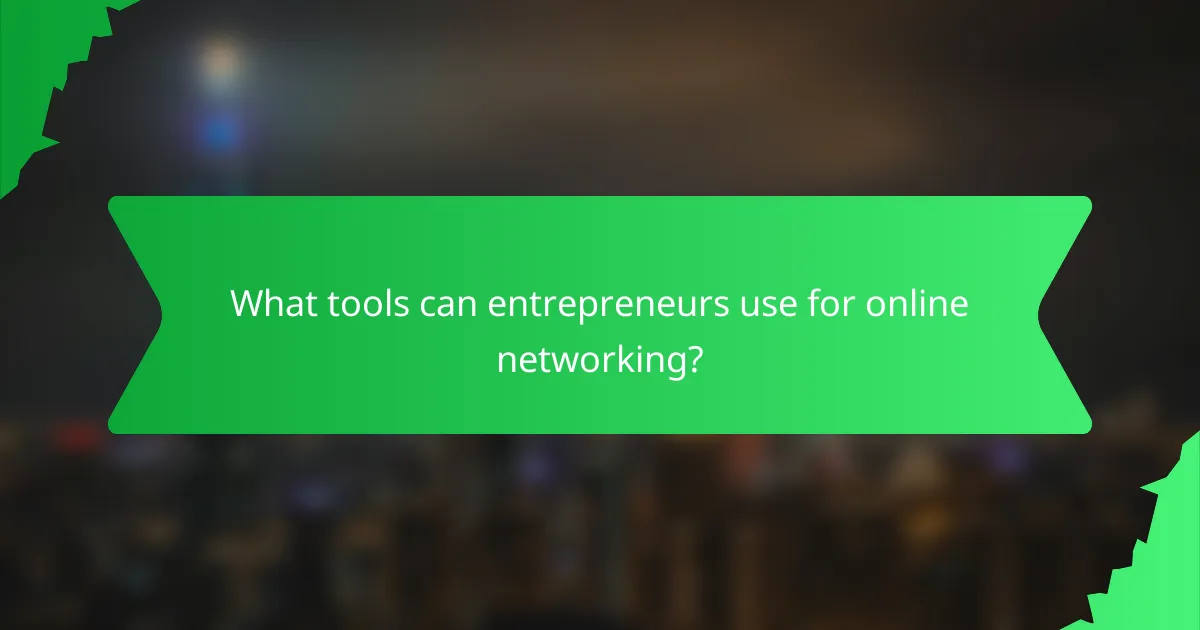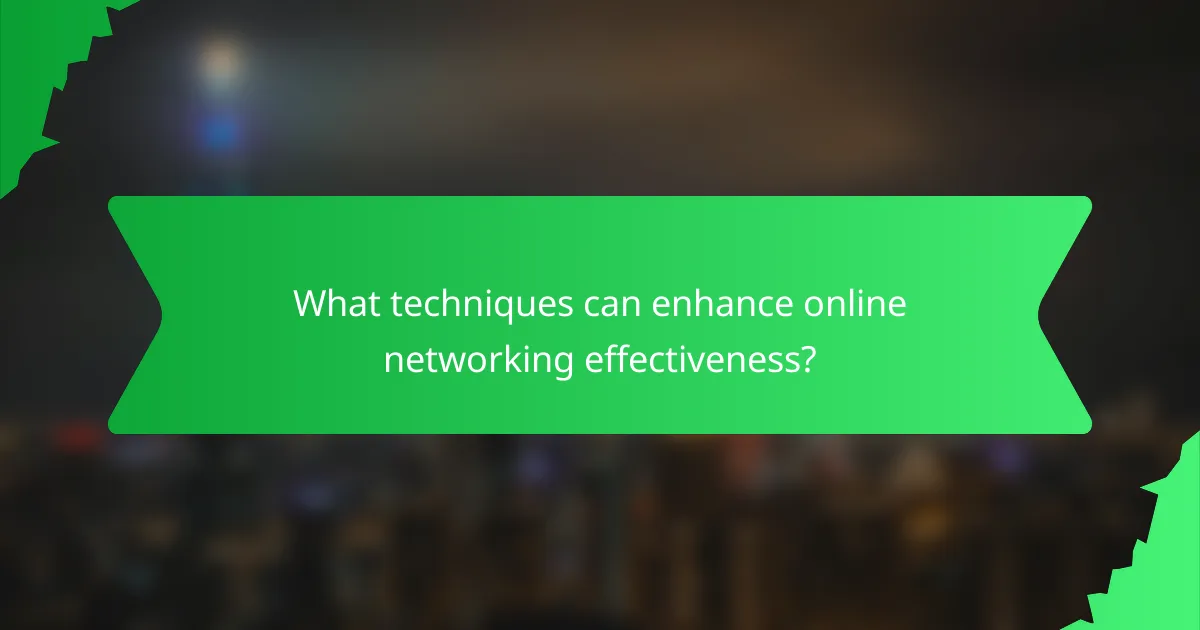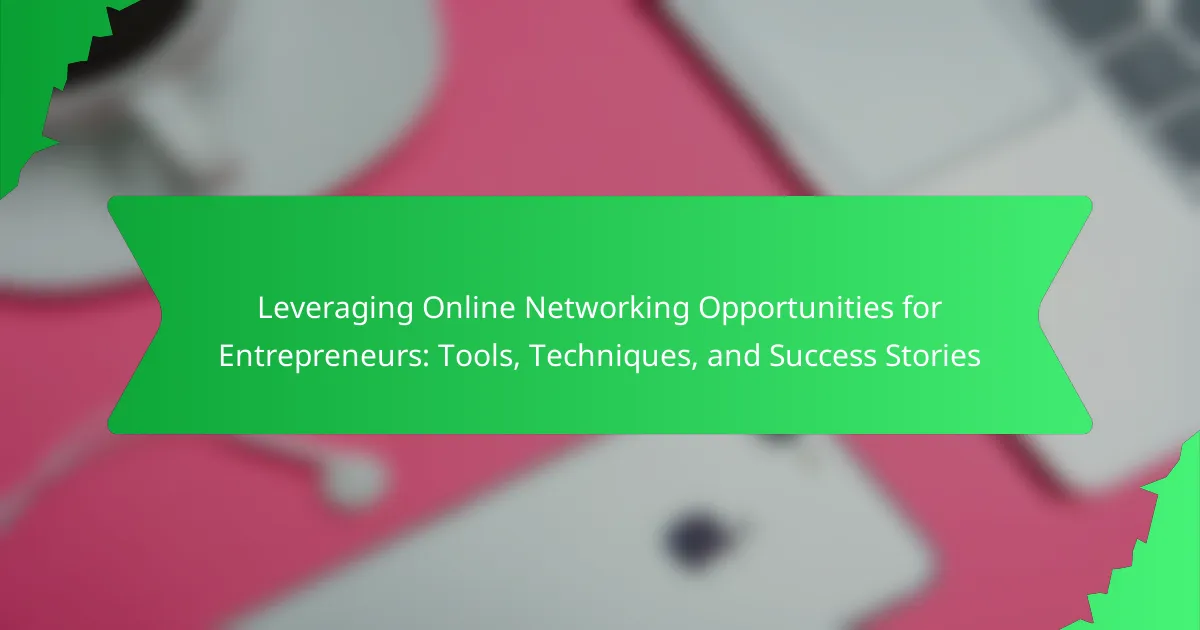Online networking opportunities for entrepreneurs are essential for building professional connections and fostering collaboration. Key platforms include LinkedIn, Facebook Groups, and various online forums, which facilitate interactions with like-minded individuals and industry-specific peers. Entrepreneurs can enhance their networking efforts through tools such as video conferencing software, networking apps, and targeted outreach strategies. Engaging in personalized communication and actively participating in discussions can significantly improve engagement rates and solidify relationships. This article will explore the tools, techniques, and success stories that highlight the importance of online networking for entrepreneurs.

What are Online Networking Opportunities for Entrepreneurs?
Online networking opportunities for entrepreneurs include platforms such as LinkedIn, Facebook Groups, and online forums. These platforms facilitate connections with like-minded individuals and potential collaborators. Entrepreneurs can join industry-specific groups to share insights and gain advice. Webinars and virtual conferences offer networking through discussions and Q&A sessions. Social media channels allow entrepreneurs to showcase their expertise and engage with their audience. Online networking events provide opportunities for direct interaction with peers and mentors. Research shows that 85% of jobs are filled through networking, highlighting its importance for entrepreneurs.
How can entrepreneurs effectively leverage online networking?
Entrepreneurs can effectively leverage online networking by actively engaging on social media platforms and professional networks. They should focus on building meaningful connections with industry peers and potential clients. Regularly sharing valuable content can enhance their visibility. Participating in relevant online groups fosters collaboration and knowledge sharing. Utilizing tools like LinkedIn for targeted outreach can lead to strategic partnerships. Attending virtual events and webinars expands their network and learning opportunities. Research shows that 70% of people get hired at companies where they have a connection. This highlights the importance of networking in career advancement.
What platforms are most beneficial for online networking?
LinkedIn, Facebook, and Twitter are the most beneficial platforms for online networking. LinkedIn is specifically designed for professional connections. It has over 900 million members, facilitating industry-specific networking. Facebook offers groups and events that help users connect based on shared interests. Twitter allows for real-time conversations and engagement with industry leaders. Each platform provides unique tools for networking, such as messaging and group features. These platforms have proven effective for entrepreneurs seeking to expand their networks. Studies show that 70% of professionals find jobs through networking.
How do online networking opportunities differ from traditional networking?
Online networking opportunities differ from traditional networking primarily in their accessibility and scope. Online networking allows individuals to connect globally without geographical limitations. Traditional networking typically occurs in person and is often limited to local environments.
In online networking, participants can engage through various digital platforms like LinkedIn, Twitter, and specialized forums. These platforms provide tools for instant communication and information sharing. Traditional networking often relies on face-to-face interactions and scheduled events.
The speed of connection is another key difference. Online networking enables real-time interactions, while traditional networking can involve delays in scheduling meetings. Additionally, online networking often features a broader audience, allowing for diverse connections across industries.
Research indicates that 70% of jobs are found through networking, emphasizing the importance of both methods. However, online networking has grown significantly, especially post-2020, as remote work became prevalent. This shift highlights the increasing reliance on digital platforms for professional growth and collaboration.
Why is online networking essential for entrepreneurs today?
Online networking is essential for entrepreneurs today because it facilitates access to a broader audience and valuable connections. It allows entrepreneurs to build relationships with potential clients, partners, and investors. According to a study by LinkedIn, 85% of jobs are filled through networking. Online platforms provide tools for entrepreneurs to showcase their expertise and engage with industry leaders. Additionally, online networking enables access to resources and information that can drive business growth. The ease of communication through social media and professional networks accelerates collaboration and innovation. In today’s digital age, leveraging these connections is crucial for business success.
What advantages does online networking provide for business growth?
Online networking provides significant advantages for business growth. It facilitates access to a larger audience without geographical limitations. Businesses can connect with potential clients, partners, and investors globally. This expanded reach can lead to increased sales and opportunities.
Additionally, online networking fosters relationship-building through platforms like LinkedIn and social media. Engaging with industry peers enhances credibility and brand visibility. A study by the Harvard Business Review found that networking can increase sales by 20% for small businesses.
Furthermore, online networking allows for real-time communication and collaboration. Businesses can share resources and knowledge quickly. This agility can lead to innovation and improved efficiency. Overall, online networking is a powerful tool for driving business growth.
How does online networking enhance visibility and reach?
Online networking enhances visibility and reach by connecting individuals and businesses to a broader audience. It allows for the sharing of content across various platforms, increasing exposure. Social media platforms like LinkedIn and Twitter facilitate interactions with potential clients and collaborators. These interactions can lead to new opportunities and partnerships. According to a survey by HubSpot, 64% of marketers actively engage in online networking for lead generation. This statistic underscores the effectiveness of online networking in expanding one’s professional reach. Additionally, online networking enables entrepreneurs to showcase their expertise through webinars and online forums. This visibility can attract attention from industry leaders and influencers.

What tools can entrepreneurs use for online networking?
Entrepreneurs can use various tools for online networking. Social media platforms like LinkedIn facilitate professional connections. Networking apps such as Shapr allow users to meet like-minded individuals. Video conferencing tools like Zoom enable face-to-face interactions remotely. Online forums and communities, such as Reddit and Meetup, provide spaces for discussion. Email marketing tools help entrepreneurs reach out to potential contacts. Project management software, like Slack, fosters collaboration among teams. Each tool serves a specific purpose in enhancing networking opportunities for entrepreneurs.
Which social media platforms are best for networking?
LinkedIn is the best social media platform for professional networking. It focuses specifically on connecting professionals and businesses. LinkedIn has over 900 million users, making it a vast network for opportunities. Users can showcase their skills and experience through profiles. The platform offers groups and forums for industry-specific discussions. Facebook is also useful for networking through professional groups. Twitter allows for real-time engagement and connection with industry leaders. Instagram can be leveraged for networking through visual storytelling. Each platform serves unique networking purposes based on user goals.
What features do these platforms offer to entrepreneurs?
These platforms offer entrepreneurs various features to enhance their networking and business growth. They provide tools for connecting with industry peers and potential clients. Many platforms include messaging systems for direct communication. They often feature discussion forums for sharing insights and advice. Additionally, entrepreneurs can access resources like webinars and tutorials. Some platforms offer analytics to track engagement and performance. They may also provide templates for business plans or marketing strategies. Lastly, many platforms facilitate collaboration through project management tools.
How can entrepreneurs optimize their profiles for networking success?
Entrepreneurs can optimize their profiles for networking success by ensuring clarity and professionalism. A well-defined profile includes a professional photo and a concise bio. Profiles should highlight relevant skills and experiences. Utilizing keywords related to their industry enhances discoverability. Entrepreneurs should engage with their network through regular updates and valuable content. Joining relevant groups and participating in discussions increases visibility. Personalizing connection requests fosters meaningful relationships. Research indicates that profiles with complete information receive 21 times more profile views and 36 times more messages.
What networking tools can facilitate connections?
Networking tools include platforms like LinkedIn, Meetup, and Slack. LinkedIn allows professionals to connect, share content, and build their networks. Meetup helps users find local events and groups based on shared interests. Slack facilitates communication and collaboration within teams and communities. Other tools include Zoom for virtual meetings and Twitter for networking through hashtags and discussions. These tools enhance visibility and accessibility, making it easier to form connections. Studies show that effective networking can lead to increased opportunities and business growth.
How do networking apps improve interaction among entrepreneurs?
Networking apps enhance interaction among entrepreneurs by facilitating connections and communication. These platforms enable entrepreneurs to find potential collaborators and mentors easily. They offer features like messaging, video calls, and forums for real-time discussions. Networking apps also provide access to a global audience, expanding opportunities beyond local markets. According to a study by LinkedIn, 85% of jobs are filled through networking, emphasizing the importance of these connections. Additionally, networking apps can host events and webinars, allowing entrepreneurs to learn and share knowledge. This interactive environment fosters collaboration and innovation among users.
What role do webinars and online events play in networking?
Webinars and online events are crucial for networking. They provide a platform for individuals to connect with industry professionals. Participants can engage in real-time discussions and Q&A sessions. This interaction fosters relationship-building and collaboration. According to a study by the Event Marketing Institute, 84% of participants in virtual events report making new connections. These connections can lead to business opportunities and partnerships. Additionally, online events often feature networking breakout sessions. This allows for smaller group interactions, enhancing personal connections. Overall, webinars and online events facilitate valuable networking experiences.

What techniques can enhance online networking effectiveness?
Engaging in targeted outreach enhances online networking effectiveness. This involves identifying specific individuals or groups relevant to your goals. Tailoring your messages to resonate with their interests increases the likelihood of a positive response. Utilizing social media platforms strategically can broaden your reach. Regularly participating in discussions and forums establishes your presence and credibility. Following up with connections solidifies relationships and fosters collaboration. Research shows that personalized communication improves engagement rates significantly. A study by HubSpot found that personalized emails can increase click-through rates by 14%.
How can entrepreneurs build meaningful relationships online?
Entrepreneurs can build meaningful relationships online by actively engaging with their audience. They should participate in discussions on social media platforms relevant to their industry. Responding to comments and messages fosters connection and trust. Sharing valuable content establishes authority and encourages interaction. Collaborating with other entrepreneurs can expand their network and create mutual benefits. Joining online communities and forums allows for deeper engagement with like-minded individuals. Hosting webinars or live Q&A sessions provides opportunities for direct interaction. Regularly following up with contacts helps maintain relationships over time. According to a report by LinkedIn, 85% of jobs are filled through networking, highlighting the importance of relationship-building in professional success.
What strategies can be used to initiate conversations?
Effective strategies to initiate conversations include asking open-ended questions, sharing personal experiences, and using common interests as conversation starters. Open-ended questions encourage detailed responses and engagement. For example, asking “What inspired you to start your business?” invites the other person to share their story. Sharing personal experiences can create relatability and encourage reciprocation. Mentioning a mutual interest, such as a shared industry or hobby, can establish a connection. According to research by the Journal of Business Communication, initiating conversations with relevant topics increases interaction rates significantly.
How should entrepreneurs follow up after initial networking interactions?
Entrepreneurs should follow up after initial networking interactions by sending a personalized message. This message should express gratitude for the conversation. They should reference specific points discussed to reinforce the connection. Following up within 24 to 48 hours is ideal to maintain momentum. Entrepreneurs can suggest a future meeting or collaboration opportunity. This approach demonstrates genuine interest and professionalism. Research shows that timely follow-ups significantly enhance relationship-building in networking. A study by the Harvard Business Review indicates that personalized follow-ups increase response rates by up to 30%.
What common mistakes should entrepreneurs avoid in online networking?
Entrepreneurs should avoid several common mistakes in online networking. One major mistake is failing to personalize outreach messages. Generic messages can lead to low engagement rates. Another mistake is neglecting to follow up with connections. Consistent communication is key to building relationships. Entrepreneurs often overlook the importance of providing value. Sharing insights or resources helps establish credibility. Additionally, they may focus too much on selling rather than building rapport. Networking is about relationships, not just transactions. Lastly, entrepreneurs sometimes ignore their online presence. A professional profile enhances credibility and attracts connections. These mistakes can hinder effective online networking and limit opportunities for growth.
How can poor communication impact networking efforts?
Poor communication can severely hinder networking efforts. It leads to misunderstandings and misinterpretations of intentions. Clear communication builds trust and rapport, which are essential in networking. Without effective communication, opportunities for collaboration may be missed. Networking relies on exchanging ideas and information accurately. A lack of clarity can result in lost connections and reduced professional growth. Studies show that effective communication improves relationship-building by 50%. Thus, poor communication directly undermines the potential benefits of networking.
What are the pitfalls of over-promoting oneself online?
Over-promoting oneself online can lead to negative perceptions and reduced credibility. Excessive self-promotion often annoys audiences, resulting in disengagement. This can damage relationships with potential clients or partners. Research indicates that 70% of users prefer authentic content over promotional material. Over-promotion may also trigger backlash on social media, leading to negative comments or unfollows. Furthermore, it can create a perception of insecurity or desperation. This perception can hinder trust-building in professional networks. Ultimately, over-promotion can undermine long-term success in online networking.
What are some success stories of entrepreneurs leveraging online networking?
Entrepreneurs have successfully leveraged online networking to grow their businesses. For example, Tim Ferriss used platforms like Twitter and LinkedIn to build his personal brand. He connected with influencers and gained visibility for his book, “The 4-Hour Workweek.”
Another success story is that of Sophia Amoruso, founder of Nasty Gal. She utilized social media to market her vintage clothing line. Her online presence helped her reach a wider audience, leading to significant sales growth.
Additionally, the founders of Airbnb used online networking to connect with investors and gain initial funding. They showcased their platform on social media, which attracted attention and facilitated partnerships.
These examples illustrate how effective online networking can be for entrepreneurs in various industries.
How did specific entrepreneurs achieve success through online networking?
Specific entrepreneurs achieved success through online networking by utilizing platforms like LinkedIn and Twitter. They built professional relationships that led to collaborations and partnerships. For instance, Gary Vaynerchuk leveraged social media to connect with influencers and grow his brand. Similarly, Reid Hoffman used LinkedIn to network with professionals, which facilitated business opportunities. These entrepreneurs engaged actively in online communities, sharing insights and expertise. This approach increased their visibility and credibility in their respective fields. Studies show that 85% of jobs are filled through networking, highlighting its importance. Online networking allowed these entrepreneurs to access resources and mentorship, further enhancing their success.
What lessons can be learned from these success stories?
Success stories in online networking reveal several key lessons for entrepreneurs. First, building authentic relationships is crucial. Entrepreneurs who prioritize genuine connections often see better collaboration opportunities. Second, consistency in engagement is important. Regular interaction helps maintain visibility and strengthens networks. Third, leveraging diverse platforms enhances reach. Using multiple social media channels can attract a wider audience. Fourth, sharing valuable content establishes authority. Entrepreneurs who provide insights build trust within their networks. Finally, adaptability is essential. Successful entrepreneurs adjust their strategies based on feedback and results. These lessons underscore the importance of strategic networking in entrepreneurial success.
What best practices should entrepreneurs follow for effective online networking?
Entrepreneurs should prioritize building genuine relationships for effective online networking. Authenticity fosters trust and encourages meaningful connections. Engaging actively in relevant online communities enhances visibility and credibility. Sharing valuable insights and resources positions entrepreneurs as thought leaders. Consistency in communication helps maintain relationships over time. Utilizing professional networking platforms like LinkedIn can expand reach significantly. Following up with contacts after initial interactions solidifies connections. Research shows that 85% of jobs are filled through networking, highlighting its importance in business growth.
The main entity of this article is online networking opportunities for entrepreneurs. The article provides a comprehensive overview of various platforms such as LinkedIn, Facebook Groups, and online forums that facilitate connections and collaborations among entrepreneurs. It outlines effective strategies for leveraging these networking tools, discusses the advantages of online networking compared to traditional methods, and highlights best practices for building meaningful relationships. Additionally, it presents success stories of entrepreneurs who have effectively utilized online networking to enhance their visibility and drive business growth.
